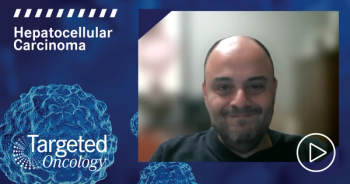
Part 2: Factors for Considering Transplant or Immunotherapy in HCC
During a live virtual event, Richard S. Finn, MD, discussed the process of selecting frontline treatment for hepatocellular carcinoma including liver and kidney transplants and immunotherapy agents.
DISCUSSION QUESTION
What factors would you consider in selecting frontline systemic therapy for a patient with hepatocellular carcinoma (HCC)?
SARMEN SARKISSIAN, MD: There is a case series for liver and kidney transplants. The liver grafts fail within 1 or 2 weeks, almost every single one. For kidney [transplants], I think you might also get away with it.
FINN: I am at a large liver transplant center, and we have generally shied away from it. I recently gave a patient nivolumab [Opdivo]. He was at the very end of his course for everything; we gave him FOLFOX and he is 10 years out from his transplant now. We watched him very closely; he had no toxicity, but no benefit either. I would not recommend this as a standard, frontline approach. These case series show a high risk of liver failure and rejection.
Now, if they have autoimmune disease? Using atezolizumab [Tecentriq] or any immunotherapy [IO] drug in liver cancer is not different from any other malignancy where these drugs are approved. High risk of autoimmune hepatitis, which was always an initial concern, is something to keep in mind.
ANDREW PHAM, MD: I think if you are looking for downgrading, you are either relying on atezolizumab plus bevacizumab [Avastin] with an ORR of 30%, or with lenvatinib [Lenvima] where [I think it is about] 20%. If you are using an immunotherapy, you are trying to get the patient to transplant. I think this is a tough choice.
FINN: If you want a response, obviously atezolizumab plus bevacizumab has a higher response. About transplant, I think your point about having an IO drug on the board is not what we are doing; that is more likely local-regional treatment. But this idea of neoadjuvant before resection maybe will have patients getting big responses who we would then consider for resection.
CHAND: I just want to verify, if you give someone an IO drug, can they still go to transplant later if you downstage them?
FINN: This is a new realm…and not something that we had to deal with in the past. I do not think we want to see them having an IO within a certain time before they get their liver transplant. I think that is something that [individuals] are trying to figure out.
If they have an IO on board, there has been some discussion about when you stop the IO. Just because they had a dose 1 year ago would probably not preclude them but having it close to transplant has been associated with a higher risk of rejection.
Any other issues that come into mind when you are choosing your first-line therapy that we have not discussed? Patient preference, obviously, will always weigh in. Convenience? Cost? I guess insurance approval will always be [a factor].
KARWAL: You can treat with the atezolizumab plus bevacizumab for this 7-cm tumor and hope to get a response. If it goes to 4 cm, stop the atezolizumab plus bevacizumab then use local-regional therapy, and then get the liver transplant. It is kind of a dream because you do not get there very often, but it is a possibility.
FINN: With atezolizumab plus bevacizumab only being recently approved, it is a new realm of things. Honestly, the other flip side is some of these patients are doing very well and they have had dramatic responses, so do we mess with that? Maybe some of these patients may be cured over time.
DISCUSSION QUESTIONS
- How do the toxicity profiles of lenvatinib and sorafenib differ as used for unresectable HCC?
- What is your approach to AE prevention, monitoring, and management with these agents?
- Do you view these drugs the same as far as toxicity, or is one a little harder than the other?
FINN: Hand-foot syndrome [HFS] is more common and more high-grade with sorafenib [Nexavar] vs lenvatinib. Diarrhea is the same for both, but maybe slightly higher with sorafenib. Hypertension is more of an issue with lenvatinib, but I think it reflects its potent VEGF inhibition activity. It also causes dysphonia and proteinuria. Appetite loss is similar between the 2, but a little higher with lenvatinib. Weight loss is a little higher with lenvatinib vs sorafenib.1
LELAND GREEN, MD: I found lenvatinib to be a little tougher. The weight loss and hypertension are tougher, but I think it is manageable. It just requires keeping a closer eye on the patients. I tend to go more for that because I think it is a more active drug. Aside from the HFS, which is something I have not run into, the weight loss and hypertension are issues that I have made dose adjustments on.
SWARNA CHANDURI, MD: Lenvatinib used in other tumors like renal cell and endometrial carcinoma is well tolerated. The hypertension is under control and diarrhea is not a big problem. I have not had anybody with HCC, but I think with a little dose adjustment, the hypertension or weight loss can be well managed unless the underlying HCC problems complicate it.
FINN: Hypertension does happen even in liver patients who tend to run a little low blood pressure to start with. Maybe the hardest thing for these patients is the anorexia and weight loss. There is no quick fix for that. Often, they need a little break or dose reduction from 12 mg to 8 mg or 8 mg to 4 mg, depending on their starting dose.
Reference
1. Kudo M, Finn RS, Qin S, et al. Lenvatinib versus sorafenib in first-line treatment of patients with unresectable hepatocellular carcinoma: a randomised phase 3 non-inferiority trial. Lancet. 2018;391(10126):1163-1173.
doi:10.1016/S0140-6736(18)30207-1









































